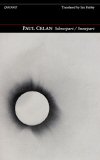1. SELECTIONS by Ian Hamilton Finlay
Published by The University of California Press; buy here.
Reviewed by Simon Turner
Published as part of the University of California’s
Poets of the Millennium series, this
is a generous and necessary selection of the Scottish concrete poet’s
work. Necessary because of Hamilton’s
methods of publication, as he favoured for the most part either fugitive forms
(posters, broadsides, postcards), or permanent site-specific pieces in gardens
and public places, meaning that much of the work gathered here has not been previously
accessible to the general reader. An
excellent introduction by the poet’s son, Alec Finlay, proffers a wealth of
biographical and critical material (including generous quotations from Finlay’s
vigorous correspondence), which is vital for any appreciation of a writer such
as Finlay, who seemed to thrive on contradictory extremes. Provincial and internationalist, conservative
and revolutionary, classical formalist and avant
garde rabble-rouser: Finlay was all these things, and the real achievement
of this selection is that a functioning continuity is delineated, whereby these
disparate modes can be incorporated into the larger narrative of Finlay’s
work. If the concrete pieces here are
not as immediately accessible or fun-loving as the comparable work being carried
out by, say, Edwin Morgan during the same period, they have a severe beauty of
their own, whilst Finlay’s more cantankerous aphorisms (“Tolkien is a teashop
Wagner”, for example) are genuinely entertaining. Finlay himself provides, in Camouflage Sentences, perhaps the most
fitting summation of his aesthetic: “To camouflage a tank is to add what
Shenstone calls ‘the amiable to the severe’ – the beautiful to the sublime,
flutes to drums”.
2. ANIMA by Mario Petrucci
Published by Nine Arches Press; buy here.
Reviewed by the Judge.
The guy above me already wrote a full review of this book, which is kind of a load off my shoulders – summing up this verse
in the six/seven minutes of a video review would have been a Batmanian task
(the adjective substitutes ‘Olympian’ – it’s 2014, noobs!!). But, repetita iuvant: I can’t help but throw
in an extra recommendation for one of the best books of poetry I’ve read the whole of last year, Mario Petrucci’s anima.
I’m generally not too fond of poetry which hammers the line-break (many of
these poems have only two words per line or thereabouts), but here it is so
skilfully pulled off that you almost breathe in tune with the words. I’ve
seldom read poetry that so successfully reproduces the intimate rhythms of the
human heart (literally and metaphorically). The poetry in anima is built on concatenation – each line extends the word or the
sentence before it, which you thought a moment ago to be complete, and this
continuous alternation between plenitude and flux results in an organic,
breathless and intensely lyrical ‘narrative’ (for lack of better words). It’s
kind of like Guitar Hero, you can’t
really describe it, it’s got to be experienced.
Celan, as translated by Fairley, is my go-to poet for poems that are pure jagged fragments of song - glowing, alien meteorite slivers - and Snow Part contains a bracing blizzard of them. I just can’t get enough of the portmanteaus and coinages - ‘vinehooks’, ‘intercurrent’, ‘watershabrack’ ‘woodenvisaged’, ‘templesplinters’ and on and on. Celan is sometimes called cryptic, and you certainly don’t go to these pieces for stories or discursives. What you get instead is these small, incredibly strange flashes from another world, one frightening image melting into the next.












No comments:
Post a Comment
What say you?